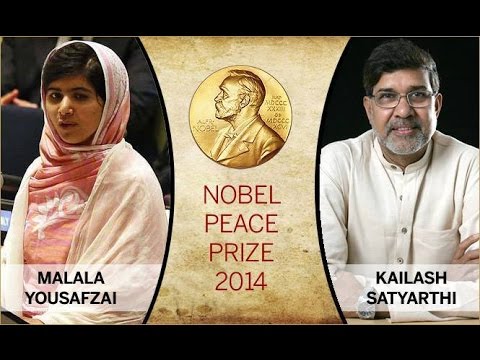Malala Yousafzai of Pakistan and Kailash Satyarthi of India today received the Nobel Peace Prize for risking their lives to fight for working to protect children from slavery, extremism and child labor at great risk to their own lives.
The 17-year-old Malala, the youngest ever Nobel winner, and Satyarthi, 60, collected the award at a ceremony in the Norwegian capital to a standing ovation.
Saying that all children have a right to childhood and education, Nobel committee chairman Thorbjorn Jagland said “this world conscience can find no better expression” than through this year’s winners. In his speech to the gathering before Norwegian royalty, Jagland related how Malala was shot in the head and critically wounded by a Taliban gunman two years ago. He said Islamic extremist groups dislike knowledge because it is a condition for freedom. “Attendance at school, especially by girls, deprives such forces from power,” he said.
He mentioned Satyarthi’s vision of ending child labor and how he abandoned a career as an electrical engineer in 1980 to fight for that vision, and singled out another Indian, Mahatma Gandhi, who remains the most notable omission in the 113-year history of the Nobel Peace Prize. Jagland said that the prize winners live according to Gandhi’s principle: “There are many purposes I would have died for. There are no purposes I would have killed for.” As Malala was receiving her award, a young man briefly ran on the stage but was whisked off quickly by a security guard. Earlier, he had shaken Malala’s hand in the Grand Hotel where she was staying, telling her how much he admired her.
The founder of the Nobel Prizes, Swedish industrialist Alfred Nobel, said the prize should go to “the person who shall have done the most or the best work for fraternity between nations, for the abolition or reduction of standing armies and for the holding and promotion of peace congresses.” The committee has interpreted those instructions differently over time, widening the concept of peace work to include efforts to improve human rights, fight poverty and clean up the environment. By honoring this year’s winners, the Norwegian Nobel Committee linked the peace award to conflicts between world religions and neighboring nuclear powers as well as drawing attention to children’s rights.
The other awards — in medicine, physics, chemistry and literature — are set to be presented in Stockholm . The ceremonies are always held on December. 10, the anniversary of prize founder Alfred Nobel’s death in 1896.
Ms Yousafzai said she was dedicating the prize money to the Malala Fund, “to help give girls everywhere a quality education and call on leaders to help girls like me…” “I will continue this fight until I see every child in school,” she added. “I feel much stronger after the attack that I endured, because I know, no-one can stop me, or stop us, because now we are millions, standing up together.”
In his speech earlier, Mr Satyarthi said he was “representing the sound of silence” and the “millions of those children who are left behind”. He said he had kept an empty chair at the ceremony as a reminder of the children without a voice. “There is no greater violence than to deny the dreams of our children,” he said.
They have split the $1.4m (£860,000) prize money




